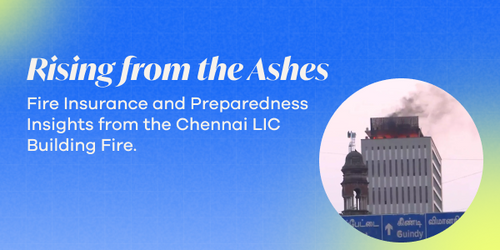The recent fire incident at the Life Insurance Corporation (LIC) building in Chennai has brought the importance of fire insurance and preparedness to the forefront. In this comprehensive post, we will delve deeper into the details of the incident and provide an extensive exploration of the value of fire insurance. We will also discuss the necessary steps to safeguard your property, ensure your safety, and protect those around you.
The Incident:
On a fateful Sunday, a massive fire erupted on the top floor of the LIC building in Chennai's Anna Salai area. Despite the intensity of the fire, no casualties were reported, thanks to the timely response of firefighting teams. Nearly 60 personnel and two skylifts worked tirelessly to extinguish the blaze. Although the exact cause is still under investigation, early reports suggest that a short circuit in the digital board may have sparked the fire. This incident highlights the potential devastation fires can cause, even in well-maintained buildings, emphasizing the need for businesses and individuals to have a comprehensive fire prevention and response plan in place.
Understanding the Importance of Fire Insurance:
Fire insurance plays a crucial role in safeguarding property owners from the financial fallout of fire-related incidents. It provides compensation for damages resulting from a fire, ensuring that property owners can rebuild or repair their properties without incurring excessive out-of-pocket expenses.
Additionally, fire insurance policies often include liability coverage. In cases where a fire originating on your property causes damage to neighboring properties or injury to others, liability coverage can protect you from potential lawsuits and financial burdens.
For businesses, fire insurance is even more vital. Adequate fire insurance can mean the difference between a quick recovery and bankruptcy. Business interruption coverage, often included in fire insurance policies, can help cover lost income and additional expenses incurred while a business is closed for repairs.
Steps to Ensure Property Safety and Fire Preparedness:
Assess your insurance policy: Regularly review your insurance policy to ensure that your property is adequately covered against fire damage. Consult with an insurance professional to determine the right coverage for your specific needs.
Install and maintain fire safety equipment: Equipping your property with smoke detectors and fire extinguishers can help detect and respond to fires quickly. Regular inspections and maintenance of these devices are necessary to ensure their optimal functioning.
Create and practice an emergency plan: Develop a comprehensive emergency plan that covers evacuation routes, designated meeting points, and emergency contact information. Familiarize yourself, your family, or your coworkers with the plan and practice it periodically to ensure everyone knows what to do in the event of a fire.
Ensure electrical safety: Regular inspections of your property's electrical systems can help identify potential hazards such as faulty wiring or overloaded circuits. Hire a licensed electrician to perform inspections and repairs as needed.
Utilize fire-resistant building materials: When constructing or renovating a property, consider using fire-resistant materials to reduce the risk of fire spreading quickly. This can increase your property's fire resistance and provide added protection.
Stay informed about fire safety: Keep yourself up-to-date with the latest fire safety guidelines and best practices to ensure you're well-prepared for potential incidents.
Conclusion:
The LIC building fire in Chennai underscores the critical need for fire insurance and preparedness in our daily lives. This incident provides a valuable opportunity for reflection and learning, reminding us all of the potential consequences of being unprepared. By actively taking steps to safeguard our properties, investing in comprehensive fire insurance, and promoting a culture of preparedness, we can contribute to a safer future for ourselves and our communities. It is our collective responsibility to learn from this event and take proactive measures, transforming this wake-up call into lasting, positive change.
Get Free Quote in Minutes

